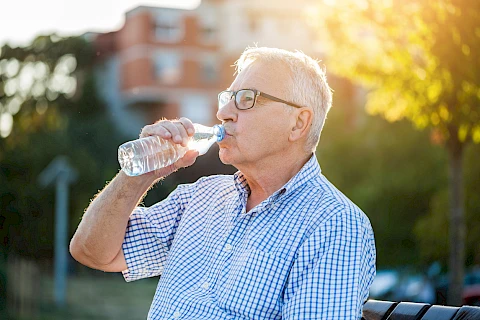
Bladder issues are common among seniors, but many don't realize how closely linked these problems are to proper hydration. Staying well-hydrated is a simple yet effective way to support bladder function and prevent issues. Explore the connection between hydration and bladder health and offer practical tips to help seniors stay hydrated.
The Connection: Hydration and Bladder Health
Proper hydration is necessary for keeping your bladder healthy. Drinking enough fluids helps flush out toxins and bacteria that could otherwise lead to infections or other bladder problems. Common bladder issues in seniors, such as urinary tract infections and incontinence, are often exacerbated by dehydration. Staying hydrated benefits bladder health and overall well-being, supporting functions like digestion and temperature regulation.
Hydration Tips for Seniors
To remain hydrated, drink plenty of water, incorporate water-rich foods, and limit caffeine and alcohol.
Drink Water Throughout the Day
An easy way to stay hydrated is to drink water consistently throughout your day. Seniors should aim to consume about nine to 13 cups of water daily, but this can vary depending on gender, individual needs, and activity levels. Instead of drinking large amounts at once, sipping small amounts regularly can be more manageable and effective.
Incorporate Water-Rich Foods
Eating foods high in water content can also help with hydration. Fruits like watermelon, strawberries, oranges, and vegetables like celery and cucumbers, are exemplary choices. Adding these foods to your meals or as snacks boosts water intake and provides essential vitamins and nutrients.
Limit Caffeine and Alcohol
Caffeine and alcohol can have a diuretic effect, leading to increased urination and potential dehydration. Reducing the consumption of beverages like coffee, tea, and alcoholic drinks can benefit bladder health. Try substituting these with herbal teas or flavored water to maintain hydration without the negative effects.
Recognizing Signs of Dehydration
You should be aware of the signs of dehydration, as early detection is imperative for preventing further health issues. Common symptoms include dry mouth, fatigue, dizziness, and dark-colored urine. If these symptoms occur, increase fluid intake and consult a doctor if they persist. Staying vigilant about these warning signs can help ensure seniors remain healthy and hydrated.
Practical Tips for Caregivers
For caregivers, encouraging seniors to drink enough fluids can sometimes be challenging. Here are some strategies to help:
- Offer water regularly, making it easily accessible.
- Add flavor to water with lemon or cucumber slices to make it more appealing.
- Create a schedule to remind seniors to drink at certain times each day.
- Monitor fluid intake by keeping track of how much is consumed.
- Encourage drinking a full glass of water with medication, if applicable.
Monitoring not just intake, but also output, ensure a healthy balance. Incorporating these habits into daily routines can make staying hydrated easy and effective.
Get Further Health Advice From Senior Helpers Princeton
Maintaining proper hydration is necessary for bladder health in seniors and offers numerous other health benefits. Follow these tips so seniors can help prevent bladder issues and improve their well-being. Contact us at Senior Helpers Princeton today for those looking for personalized senior care services in Pennington, Princeton Junction, Princeton, or Plainsboro. Whether you are a senior looking to improve your health or a caregiver seeking advice, we are here to support your journey to wellness.